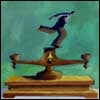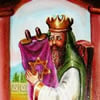The 20th century saw the expansion of democratic ideals on a global scale. Scores of nations previously ruled unilaterally by kings and dictators, or whose governments were elected by a select few members of the upper class, have adopted constitutions which recognize the intrinsic right of every citizen to participate in the process of government. New countries are constantly joining the ranks of the enlightened democratic nations, with few in recent history, if any, backsliding to totalitarianism.
The latest members to take their place in the family of democratic nations are Afghanistan and Iraq. While it took outside intervention to secure individual rights for the citizens of these countries, and there are factions within both of these countries which are determined to undermine these newfound freedoms, the vast majority of the populations of these countries have eagerly embraced the demise of their respective lands' hitherto tyrannically oppressive regimes.
The world is starting to recognize that every man is created in G‑d's imageThe trend started by the United States of America in 1776, and then reinforced in subsequent years with the recognition of all citizens as having equal rights, is taking hold on every continent. The world is starting to recognize that every man is created in G‑d's image and therefore has intrinsic rights.
We must be approaching the Messianic Era.
Or are we?
How can the expansion of democratic principles be a portent of the coming of the Messiah, when Messiah himself will be a monarch who will rule over a theocracy?! Wouldn't it be more appropriate for the years preceding the Redemption to be characterized by an increased number of nations which are governed by monarchs – kind, benevolent monarchs, to be sure, but monarchs nonetheless.
Are we progressing or regressing?
Perhaps a comprehension of the nature of the Messiah's monarchy will explain why the proliferation of democracy is the proper preparation for his arrival. But first let us analyze the difference between our first redemption, from Egypt, and the final redemption which will be ushered in by the Messiah.
The Israelites left behind a nation which was utterly decimated by ten plagues. The Egyptians who so arrogantly scoffed at the G‑d of the Hebrews, ultimately acknowledged His omnipotence: "And the Egyptians said, 'Let me run away from the Israelites because the L-rd is fighting for them against the Egyptians.'"1 Bringing about this recognition was one of the primary goals of the plagues, as G‑d repeatedly said, "And Egypt will know that I am L-rd!" But their acceptance of G‑d cannot be considered a product of their free choice; they were beaten into submission. Egyptians were still intrinsically evil, but they were coerced to accept G‑d's sovereignty because of His "dictatorial" unilateral actions.
That was a very nice start... it was sufficient to serve as the basis of the first redemption, but dictatorship is not the ultimate objective. G‑d didn't endow human beings with free choice in order to manipulate them as He wishes—for that He has hordes of angels! He gave us free choice because He wanted us to choose to recognize Him. In the words of the holy Torah: "I have set before you life and death, the blessing and the curse. Choose life!"2
G‑d didn't endow human beings with free choice in order to manipulate themThe Messianic Redemption, dubbed the "true and complete" redemption, will arrive when the world is ready to "elect" G‑d of its own volition. The prophet Hosea says,3 "The children of Israel shall return, and seek the L-rd their G‑d and David their king."
The same is true with Messiah himself. In Jewish tradition, the king — due to his obvious greatness and leadership capabilities — is chosen and crowned by the people, as opposed to a dictator who imposes his dominion on an unwilling nation.
Indeed, as we progress towards the Messianic Era, we perceive a world which by and large accepts the basic concepts of liberty, equal human rights and freedom of religion; a world which is choosing to live by moral and G‑dly ideals.
When we proclaim "We want Moshiach now," we are in effect taking part in a democratic process. We are casting our ballot for G‑d, expressing our yearning for the day when "the L-rd shall become King over all the earth; on that day shall the L-rd be one, and His name one."4







Join the Discussion